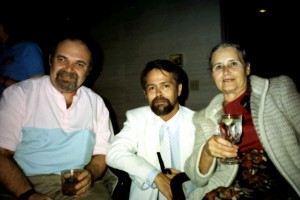The International Association for the Fantastic in the Arts presents an annual award and stipend to the graduate student submitting the most outstanding paper at the Association’s conference. The award, and a check for $250, will be presented to the winner at the Awards Banquet on Saturday evening. Students must submit their completed paper (3500 words, excluding bibliography) and verification of student status by February 1. You can find a list of past winners of the Graduate Student Award by following this link: http://fantastic-arts.org/awards/iafa-graduate-student-award/
CRITERIA & INSTRUCTIONS
1. The student will have had a paper accepted for presentation at the Conference. The paper submitted for the competition should be essentially the same as that presented at the conference. The maximum length for entries is 3500 words (about 2 pages over the recommended reading length of 8-9 pages). Students should be aware that funds are limited and that only one award will be given. The paper selected will be published in the Journal of the Fantastic in the Arts, and therefore must not have been previously published or submitted for publication elsewhere. Please note that acceptance of a paper for the Conference does not guarantee an award.
2. It is the responsibility of the student to send a copy of the paper by 1 February 2014 to the 1st VP Dale Knickerbocker (knickerbockerd@ecu.edu), as well as a copy of the letter of acceptance and verification of student status. Submissions may be in Word, RTF or PDF format.
3. The committee is looking for clear, coherent, and interesting writing. Essays should be solidly grounded in scholarly tradition, showing awareness of previous studies and of historical and theoretical contexts. Essays may use any suitable method of analysis, including historical and sociological approaches as well as those that originate in literary theory. Essays will be evaluated for their originality and quality of insight into the text.
The judges for the 2014 award will be:
Cassandra Bausman, University of Iowa
Neil Easterbrook, Texas Christian University
Farah Mendlesohn, Anglia Ruskin University
